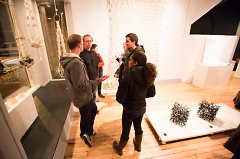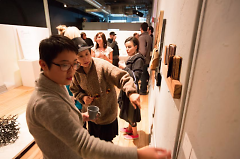For the past 12 years, the Free Radical event has sought to provoke challenging, self-reflective dialogue between members of the Grand Rapids arts community. Now a yearly Avenue for the Arts event, Free Radical includes Shows on November 7 and Conversations on November 14.
This year, the Free Radical Conversations will take place at the ArtPrize Hub (41 Sheldon Blvd.). The interactive event will feature panel discussions, presentations and displays of documenter works to explore themes from the Free Radical showcase, which takes place on November 7.
The topics attendees can expect to explore this year include “Pushing Boundaries” and “Supporting All Forms of Creation.” The conversations will include local arts professionals who will critique and discuss selected works and exhibitions.
This month, we sat down and talked with Anthony Mead, one of our panelists, to find out more about public critique and the importance of constructive dialogue for the arts community.
Anthony Mead is one of the co-owners of Dinderbeck, the only community print shop in Grand Rapids.
As a printmaker, Mead has an intimate understanding of working collectively. During his time as a printmaking student at Kendall College, Mead shared access to tools, equipment, and space with other students. As he and four fellow students neared graduation, they realized that their easy access to printmaking supplies would no longer be available to them.
“We had a moment of panic as we realized that we love printmaking and have spent all of this time learning how to print, and soon we wouldn’t be able to do this anymore,” he says. The five students made a plan to pool money and get a studio together. They named the studio Dinderbeck.
The space in 323 Straight Street started as a print area and wood shop, but quickly the artist collective started to expand. Dinderbeck moved into a bigger space within the same building to make room for a ceramic area, dark room and metal shop. Meanwhile, the collective began to add members and host shows for emerging artists.
As Dinderbeck expanded, members of the collective started having conversations about the direction in which the studio was headed. Would it continue to function as a private artists collective? Or would it open up for public use?
In July 2014, Dinderbeck opened to the public as a community print shop owned by Anthony Mead, Kyle Isbell, and Steven Rainey.
“It's important for artists to get out and talk with other artists and the public,” Mead says. “Dinderbeck and I fight against artists working in recluse. It's important for the arts community to have something to rally behind and engage with as a community.”
Mead believes the concepts of community and conversation are also important components of the Avenue for the Arts programs. His participation in the Free Radical’s public critique this year brings him to a full circle as an Avenue for the Arts participant.
“[Free Radical] opens space for support, communal and individual growth for the entire arts community. It gives young artists and experienced artists alike the opportunity to show artwork and learn from each other,” Mead notes. Through his Conversations critique, Mead hopes to uncover how different artists and curators have similar lines of inquiry and how they intersect in their work. Mead also wants to focus in on the individual artists and their artwork during his critique. He explains, “sometimes we get wrapped up in the history of events and the magic of the art gets lost.”
During his time as a Kendall student, Mead got involved with the Avenue for the Arts by selling some of his work through The Market. After his graduation in 2010, Mead worked as an Avenue for the Arts intern to coordinate Free Radical.
“Coming back to participate in Free Rad after being on the other side and knowing all that it takes to put the event together makes me feel amazing inside. It makes me feel warm and fuzzy," he says. "And a little bit nostalgic on the inside.”
In 2002, Free Radical was established by artist Mark Rumsey. Since then, the event has continued to strengthen community and commerce by shining a spotlight on Heartside as a location for innovation and enterprise. Free Radical is coordinated by the Avenue for the Arts and Dwelling Place’s Neighborhood Revitalization Department. Dwelling Place works to promote Heartside Neighborhood commercial district assets to customers, investors, businesses, visitors, and residents and enhance the physical appearance of the district.
The Avenue for the Arts is a neighborhood title for the South Division commercial corridor. We are residential, commercial and nonprofit groups working together in a creative community. We are residents in Heartside, and active participants in shaping change in our neighborhood. In 2005, we chose the Avenue for the Arts as a title to represent our commercial corridor and the projects and events that we create. Because the Avenue is powered by volunteers, guest writers create our Rapidian content. Special thanks to Avenue for the Arts intern Claudia Armijo for her coverage of Free Radical.
For the detailed Free Radical schedule and participant listing, visit www.avenueforthearts.com.
The Rapidian, a program of the 501(c)3 nonprofit Community Media Center, relies on the community’s support to help cover the cost of training reporters and publishing content.
We need your help.
If each of our readers and content creators who values this community platform help support its creation and maintenance, The Rapidian can continue to educate and facilitate a conversation around issues for years to come.
Please support The Rapidian and make a contribution today.



